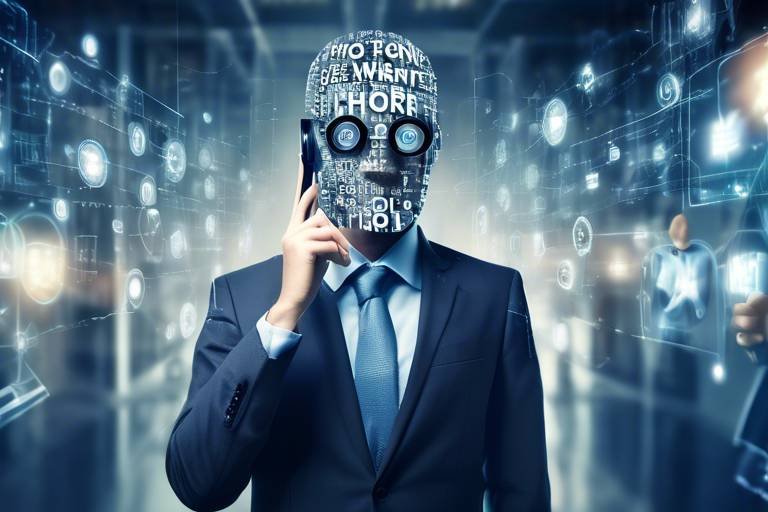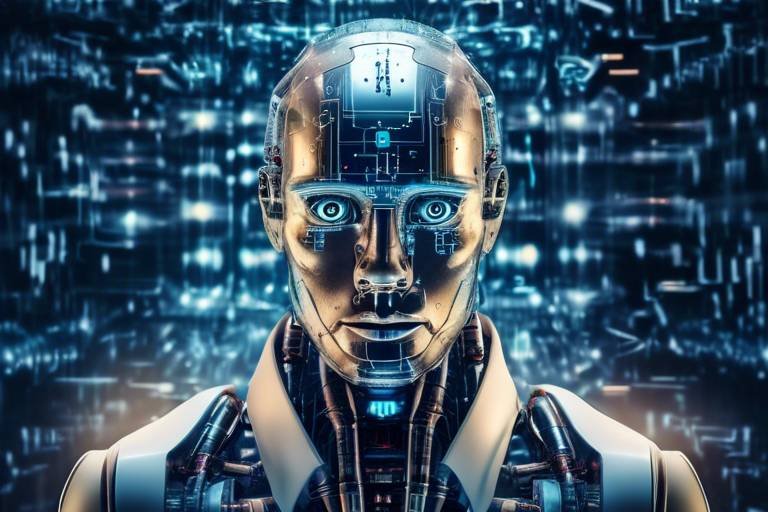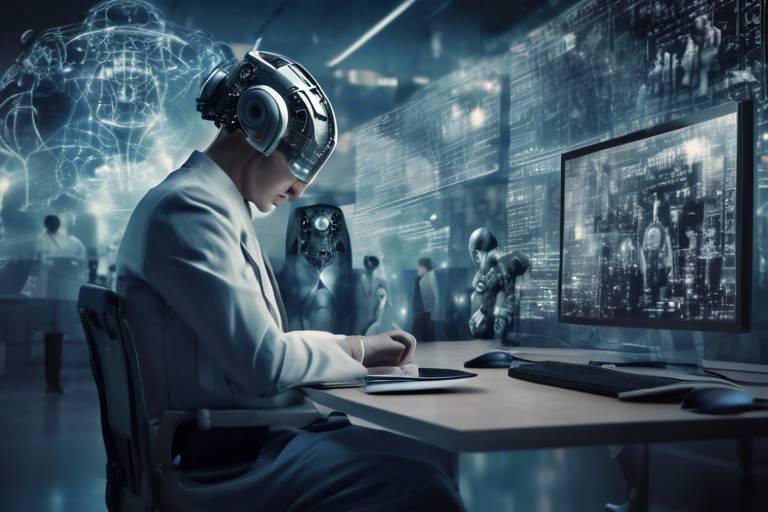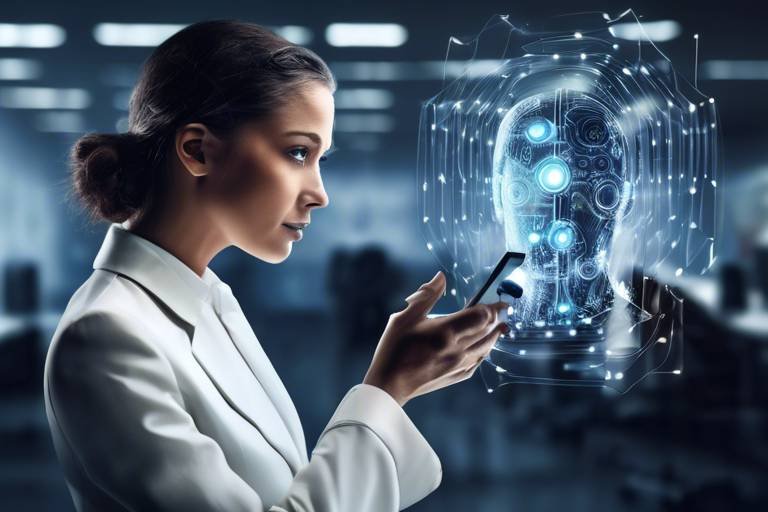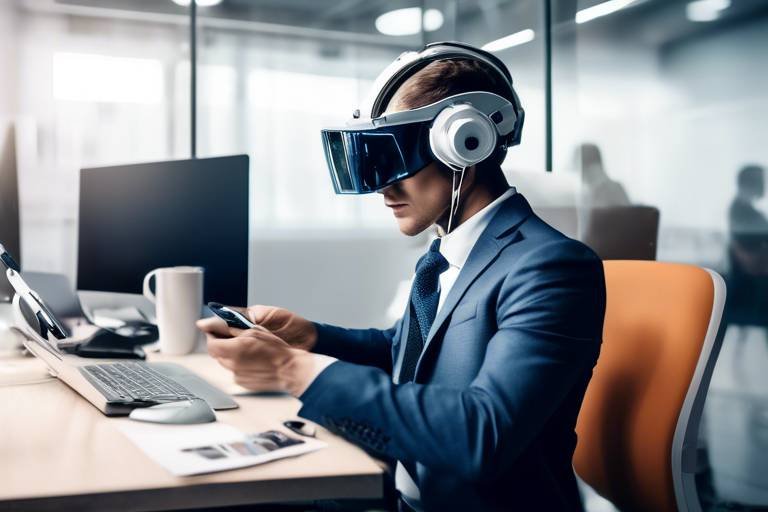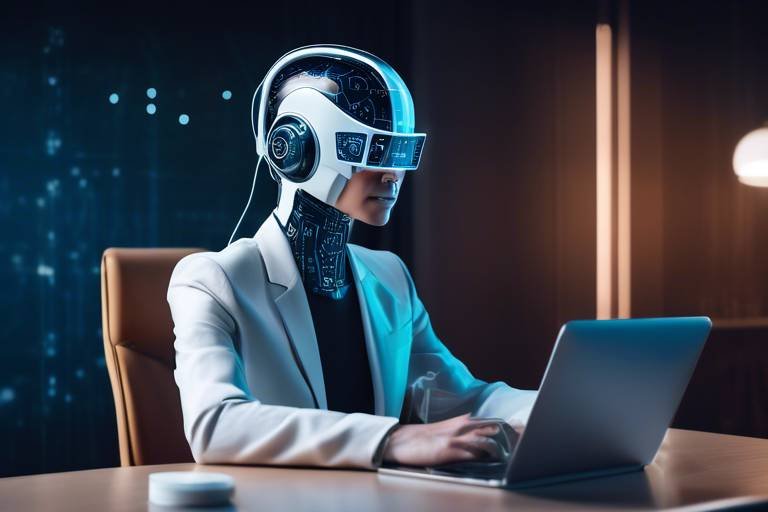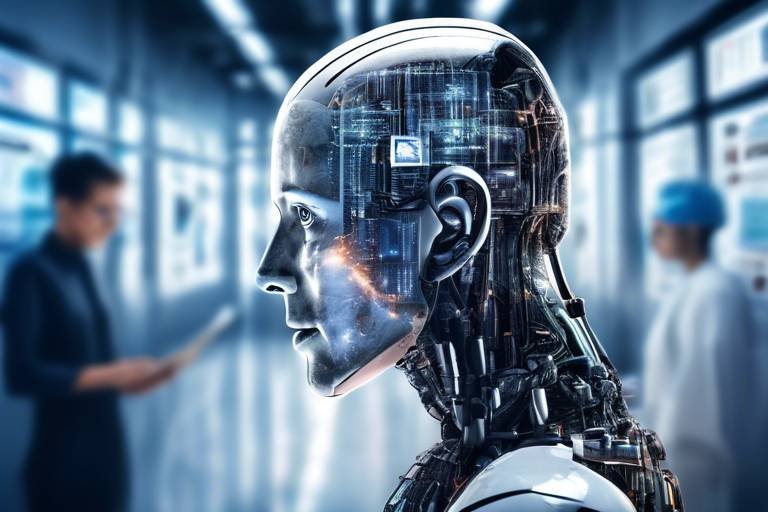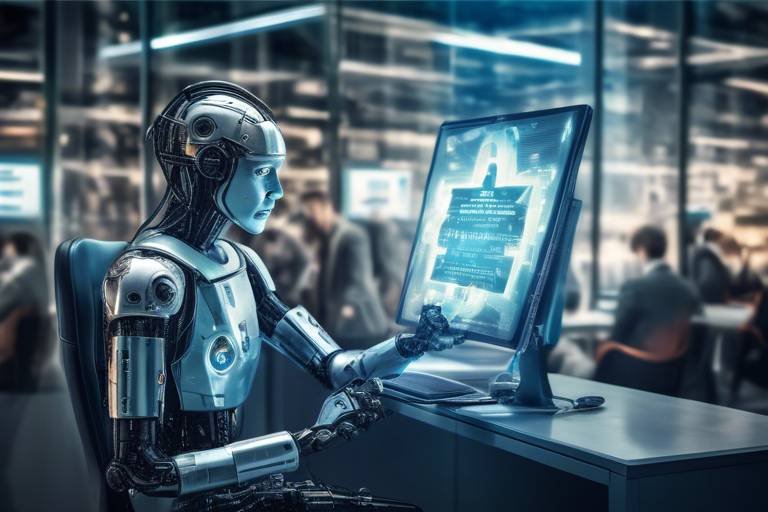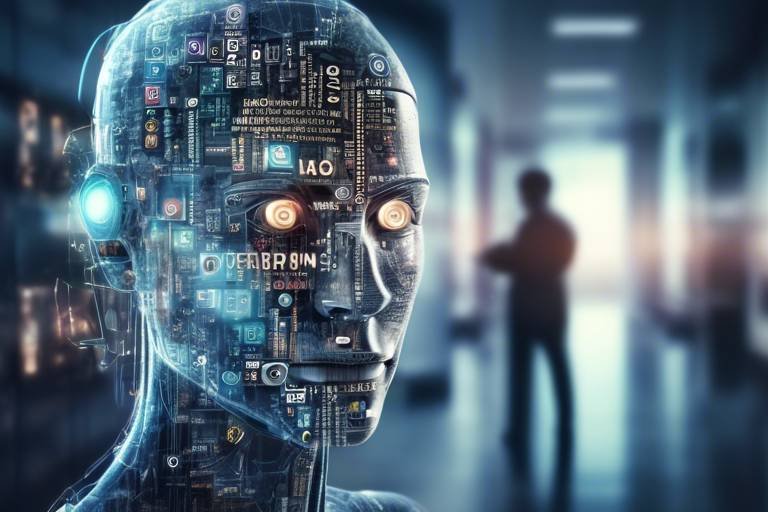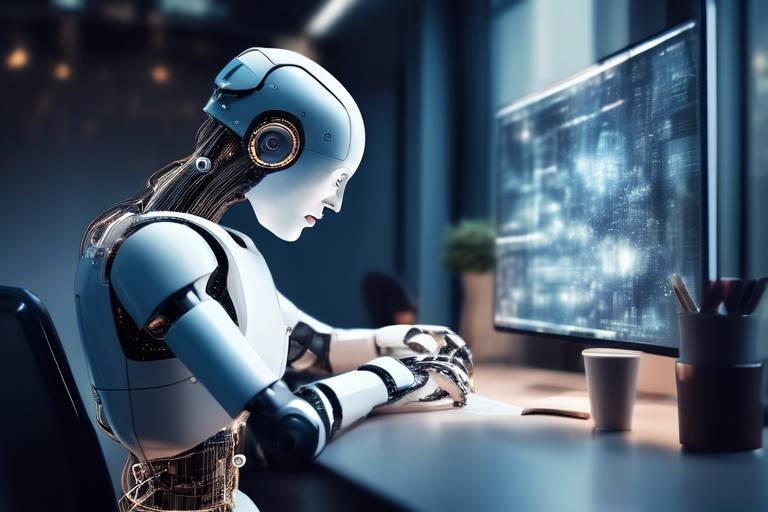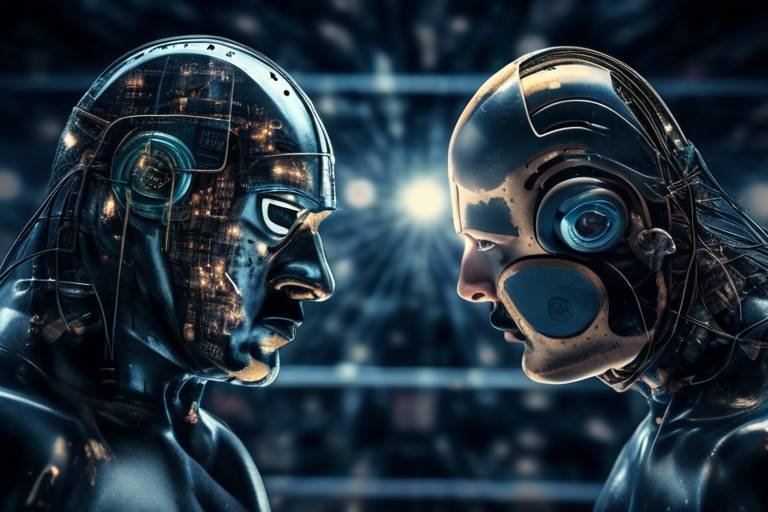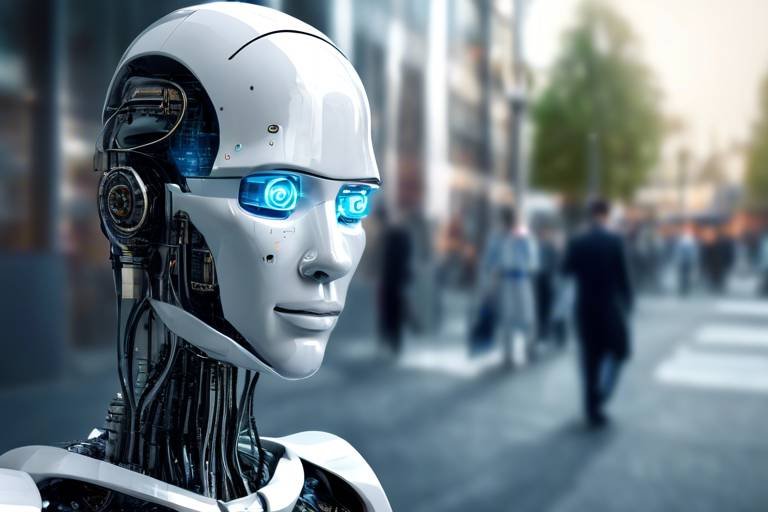The Future of HR: AI Empowering HR Decisions
In today's fast-paced business landscape, the integration of artificial intelligence (AI) into human resources (HR) is not just a trend; it's a revolution. Imagine a world where HR decisions are not only faster but also smarter, thanks to cutting-edge technology that can analyze vast amounts of data in seconds. AI is transforming how organizations manage their most valuable asset—their people. From recruitment to employee engagement, AI is empowering HR professionals to make informed decisions that enhance overall organizational performance.
So, how exactly is AI reshaping the HR landscape? Picture this: you’re a hiring manager sifting through hundreds of resumes. The traditional process can be tedious and time-consuming, often leading to missed opportunities and biases. Enter AI, which can automate the screening process, ensuring that the best candidates rise to the top without the human errors that often accompany manual reviews. This not only saves time but also promotes a more diverse and inclusive hiring process.
Furthermore, AI doesn’t just stop at recruitment. It plays a crucial role in enhancing employee engagement. Imagine having a tool that can analyze employee feedback, identify trends, and suggest tailored strategies to improve morale and productivity. This is where AI shines, allowing HR teams to create a workplace culture that motivates and retains top talent. By leveraging AI-driven performance analytics, organizations can gain real-time insights into employee performance, helping to identify high performers and address any issues proactively.
Moreover, the predictive capabilities of AI in talent management are nothing short of astounding. With the power of predictive analytics, HR can forecast employee turnover and devise retention strategies that keep talent within the organization. It’s like having a crystal ball that not only predicts future challenges but also offers solutions to mitigate them. AI can even personalize learning and development opportunities for employees, aligning training programs with individual skills and career aspirations, thus fostering a culture of continuous learning.
As we delve deeper into the operational aspects of HR, AI technologies are streamlining the onboarding process as well. Imagine a new hire walking into a workplace where their onboarding experience is tailored just for them. AI can facilitate this personalization, ensuring that new employees feel welcomed and integrated into the company culture from day one. This not only enhances the new hire's experience but also boosts overall employee satisfaction and retention rates.
In the realm of decision-making, AI equips HR professionals with advanced data analytics tools that enable informed strategic planning. The ability to analyze data trends and patterns leads to more effective decision-making processes, ultimately improving operational efficiency. For instance, organizations can identify diversity gaps and implement strategies that foster a more inclusive workplace, driving innovation and enhancing employee satisfaction.
However, it’s essential to recognize that the integration of AI in HR comes with its challenges and ethical considerations. Issues surrounding data privacy, potential biases in AI algorithms, and the need for ethical guidelines are paramount. Organizations must tread carefully and ensure that their use of AI is not only effective but also responsible and fair.
In conclusion, the future of HR is undeniably intertwined with AI. As technology continues to evolve, HR professionals must embrace these advancements to enhance their decision-making processes and optimize various functions. The promise of a more efficient, inclusive, and data-driven HR landscape is on the horizon, and organizations that leverage AI effectively will undoubtedly gain a competitive edge.
- How does AI improve recruitment processes?
AI automates candidate screening, improves job matching, and reduces biases, leading to more efficient hiring. - Can AI enhance employee engagement?
Yes, AI analyzes employee feedback and engagement levels, allowing organizations to create tailored strategies for motivation. - What role does predictive analytics play in HR?
Predictive analytics forecasts employee turnover and recommends retention strategies, helping maintain a stable workforce. - Are there ethical concerns with AI in HR?
Yes, issues such as data privacy and bias in AI algorithms must be addressed to ensure responsible use of technology.
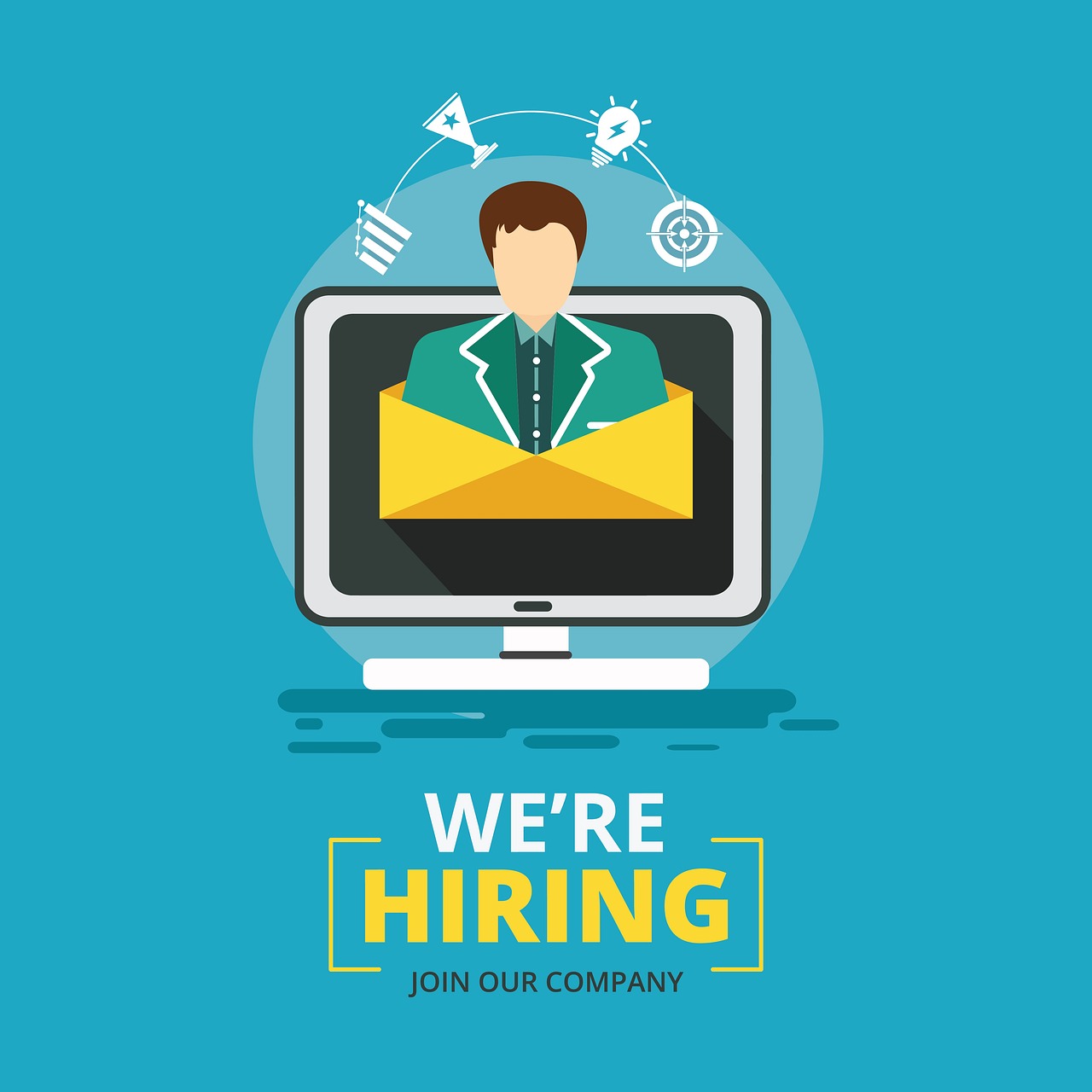
The Role of AI in Recruitment
Artificial Intelligence (AI) is not just a buzzword; it’s a game changer in the world of recruitment. Imagine a world where hiring decisions are not solely based on gut feelings but are backed by data-driven insights and algorithms. AI is revolutionizing recruitment by streamlining candidate screening, improving job matching, and reducing biases, ultimately leading to more efficient hiring processes.
One of the most significant advantages of AI in recruitment is its ability to process vast amounts of data quickly and accurately. Traditional hiring methods often involve sifting through hundreds of resumes, which can be a tedious and time-consuming task. However, with AI-powered tools, recruiters can automate the initial screening process. This means that candidates are evaluated based on their qualifications, skills, and experience without the influence of human biases. For instance, AI algorithms can analyze keywords in resumes and match them against job descriptions, ensuring that only the most suitable candidates make it to the next round.
Moreover, AI enhances job matching by utilizing machine learning algorithms that learn from past hiring decisions. These systems can identify patterns and predict which candidates are likely to succeed in specific roles. This predictive capability not only saves time but also increases the chances of finding the perfect fit for the organization. Imagine having a virtual assistant that knows your company culture and values, and can suggest candidates who align with them!
Another crucial aspect of AI in recruitment is its potential to reduce biases. Human recruiters, despite their best intentions, can unconsciously favor certain profiles based on gender, ethnicity, or educational background. AI tools can be programmed to ignore these factors, focusing solely on the skills and qualifications that matter. This leads to a more diverse and inclusive workforce, which is essential for fostering creativity and innovation within teams.
Despite these advantages, it's essential to approach the integration of AI in recruitment with caution. While AI can significantly enhance the hiring process, it’s crucial to ensure that the data used to train these systems is unbiased and representative. Additionally, organizations must remain vigilant to avoid over-reliance on technology, balancing it with human judgment to ensure a holistic recruitment strategy.
In summary, AI is transforming recruitment by making it faster, fairer, and more efficient. By leveraging AI technologies, organizations can not only improve their hiring processes but also create a more equitable workplace. As we move forward, embracing AI in recruitment will be key to staying competitive in the ever-evolving job market.
- How does AI improve the recruitment process?
AI improves recruitment by automating candidate screening, enhancing job matching, and reducing biases, leading to a more efficient hiring process. - Can AI eliminate biases in recruitment?
Yes, AI can be programmed to focus on skills and qualifications, helping to create a more diverse and inclusive workforce. - What are the risks of using AI in recruitment?
The main risks include reliance on biased data and the potential loss of human touch in the hiring process. It's important to balance AI with human judgment.

Enhancing Employee Engagement with AI
In today's fast-paced work environment, employee engagement has become a critical factor for organizational success. Companies are increasingly recognizing that a motivated workforce leads to higher productivity, reduced turnover, and improved morale. Enter artificial intelligence—a game-changer that is transforming the way organizations understand and enhance employee engagement. By leveraging AI tools, businesses can analyze employee feedback, monitor engagement levels, and craft tailored strategies that resonate with their teams.
Imagine having a virtual assistant that not only collects data but also interprets it in a way that reveals the underlying sentiments of your workforce. AI systems can sift through mountains of feedback, identifying trends and patterns that human analysts might miss. For instance, AI can analyze comments from employee surveys, social media interactions, and even internal communication channels to gauge overall employee sentiment. This data-driven approach allows HR professionals to pinpoint specific areas needing improvement, such as communication gaps or recognition shortfalls.
Moreover, AI can facilitate real-time feedback mechanisms, allowing employees to voice their opinions and concerns without the fear of judgment. This creates an open dialogue between management and staff, fostering a culture of transparency and trust. When employees feel heard, their engagement levels naturally rise. By utilizing AI-driven platforms, organizations can implement pulse surveys that capture employee sentiment regularly, providing a continuous feedback loop that keeps the finger on the pulse of workplace morale.
Another exciting aspect of AI in enhancing employee engagement is its ability to create personalized experiences. Just as Netflix recommends shows based on your viewing history, AI can tailor development programs, recognition initiatives, and communication styles to individual employee preferences. This personalization fosters a sense of belonging and appreciation, which is vital for maintaining high engagement levels. For example, if an employee thrives on recognition, AI can suggest timely ways to celebrate their achievements, ensuring they feel valued and motivated.
Furthermore, AI can assist in identifying disengaged employees before they decide to leave the organization. By analyzing performance metrics, attendance records, and engagement survey results, AI systems can flag potential issues, allowing HR teams to intervene proactively. This predictive capability not only helps retain top talent but also cultivates a more engaged workforce overall.
In summary, the integration of AI into employee engagement strategies is not just a trend; it's a necessity for organizations aiming to thrive in the modern workplace. By utilizing AI's analytical power, companies can gain critical insights into their workforce's needs and preferences, ultimately leading to a more motivated and productive environment. The future of employee engagement is bright, and AI is at the forefront of this transformation.
- How does AI improve employee engagement?
AI enhances employee engagement by analyzing feedback, identifying trends, and personalizing experiences based on individual preferences. - Can AI replace human HR professionals?
No, AI is a tool that supports HR professionals by providing data-driven insights, but it cannot replace the human touch necessary for effective employee relations. - What are some examples of AI tools used for employee engagement?
Examples include AI-driven survey platforms, sentiment analysis tools, and personalized learning and development systems.
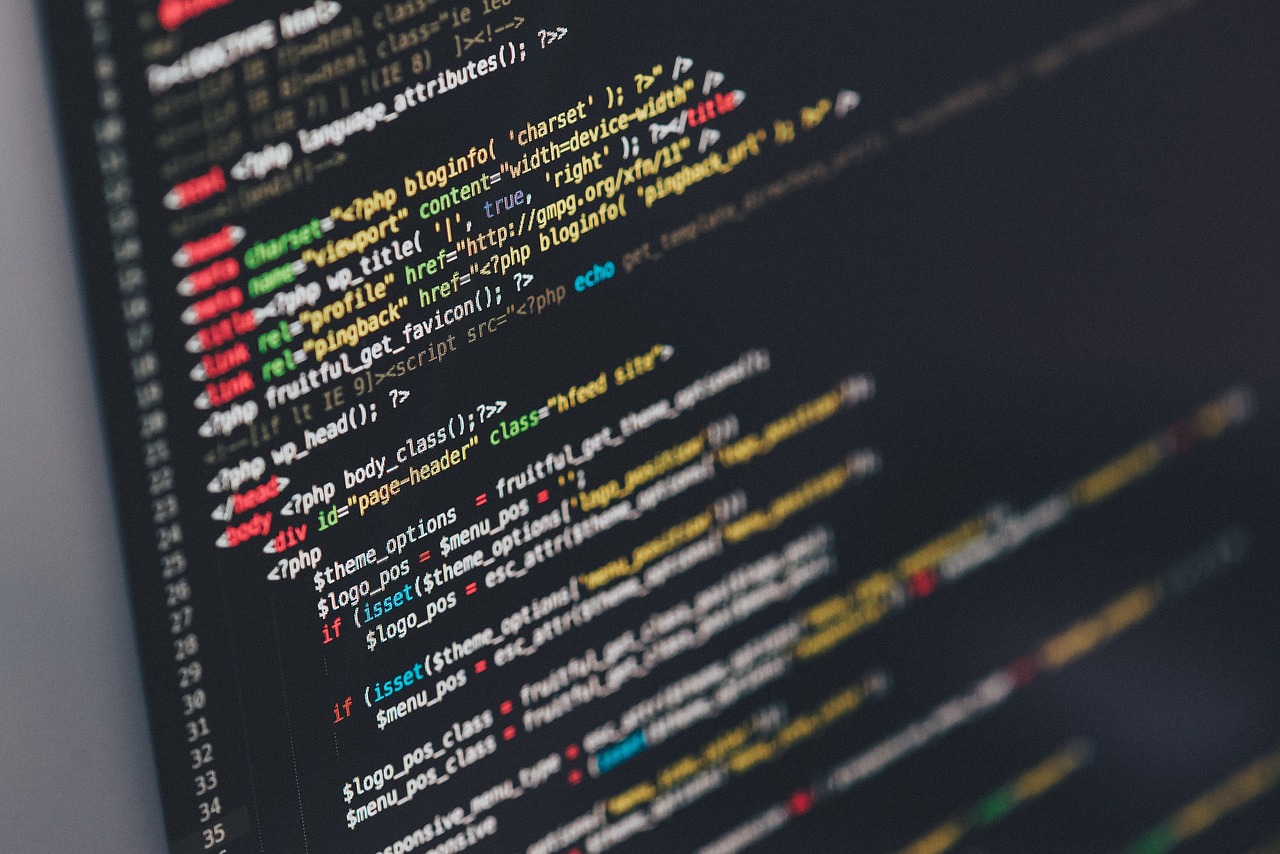
AI-Driven Performance Analytics
In today's fast-paced business environment, understanding employee performance is more crucial than ever. is at the forefront of transforming how organizations assess and enhance their workforce productivity. Imagine having a tool that not only provides real-time insights into employee performance but also identifies trends and patterns that might go unnoticed through traditional methods. This is where AI steps in, acting as a magnifying glass that reveals the intricate details of employee performance.
AI systems can analyze vast amounts of data from various sources, including project management tools, employee surveys, and even social interactions within teams. By utilizing machine learning algorithms, these systems can identify high performers and flag those who may be struggling. This enables HR teams to take proactive measures, such as offering additional support or training to employees who need it. Instead of waiting for annual reviews, organizations can now access performance insights in real-time, allowing for a more dynamic approach to managing talent.
Furthermore, AI-driven analytics can help organizations understand the impact of various factors on employee performance. For instance, it can analyze how team dynamics, company culture, and even external economic conditions influence productivity. By correlating performance metrics with these variables, HR can develop targeted strategies that foster a more engaging and productive work environment.
To illustrate the potential benefits of AI-driven performance analytics, consider the following table that outlines key advantages:
| Advantage | Description |
|---|---|
| Real-time Insights | Access to up-to-date performance data allows for immediate action and feedback. |
| Data-Driven Decisions | AI provides concrete data that informs strategic HR decisions, reducing reliance on gut feelings. |
| Personalized Feedback | Employees receive tailored feedback based on their specific performance metrics. |
| Trend Identification | AI can spot trends over time, helping HR anticipate issues before they escalate. |
Moreover, AI-driven performance analytics fosters a culture of continuous improvement. By regularly monitoring performance, organizations can encourage employees to set and achieve personal goals, leading to a more motivated workforce. Imagine a scenario where employees are not just evaluated once a year but are continuously engaged in a feedback loop that helps them grow. This creates an environment where improvement is not just a goal but a part of the organizational culture.
However, it’s essential to approach AI-driven performance analytics with a balanced perspective. While the benefits are substantial, organizations must also consider the implications of relying heavily on data. Human intuition and understanding remain invaluable, and AI should complement rather than replace the human element in performance management.
In conclusion, AI-driven performance analytics is revolutionizing how organizations perceive and manage employee performance. By leveraging data, companies can make informed decisions that not only enhance productivity but also support employee development. As we continue to embrace technology in the workplace, the potential for AI to drive performance improvements is limitless.
- What is AI-driven performance analytics? AI-driven performance analytics refers to the use of artificial intelligence tools to assess and improve employee performance through data analysis.
- How can AI help in identifying high performers? AI can analyze various performance metrics and patterns to highlight employees who consistently exceed expectations.
- Is AI-driven analytics replacing human judgment in HR? No, AI is designed to complement human judgment, providing data-driven insights that enhance decision-making.
- What are the risks associated with AI in performance analytics? Potential risks include data privacy concerns and the possibility of bias in AI algorithms, which must be addressed through ethical guidelines.

Predictive Analytics in Talent Management
In the fast-paced world of human resources, predictive analytics is emerging as a game-changer, particularly in the realm of talent management. Imagine having a crystal ball that not only forecasts potential employee turnover but also suggests effective strategies to retain top talent. This is precisely what predictive analytics offers. By leveraging historical data, organizations can gain insights into patterns and trends that influence employee behavior, enabling them to make informed decisions that enhance workforce stability.
At its core, predictive analytics utilizes advanced algorithms and machine learning techniques to analyze vast amounts of data. This can include everything from employee performance metrics to engagement survey results. For instance, if an organization notices that employees in a particular department are frequently leaving, predictive analytics can help identify underlying causes—be it lack of career advancement opportunities or poor management practices. By addressing these issues proactively, HR can significantly reduce turnover rates.
Furthermore, predictive analytics can assist in creating tailored retention strategies. For example, if data indicates that employees with specific skill sets are more likely to leave, HR can implement targeted initiatives such as:
- Offering professional development programs to enhance skills.
- Implementing mentorship opportunities that foster career growth.
- Conducting regular check-ins to gauge employee satisfaction.
Moreover, the predictive capabilities of AI allow HR teams to simulate various scenarios. This means they can test the potential impact of different interventions before implementing them. For instance, if an organization is considering a new flexible work policy, predictive analytics can help forecast how this change might affect employee retention and satisfaction. This level of insight is invaluable, as it allows HR professionals to make data-driven decisions rather than relying solely on gut feelings.
As organizations continue to embrace predictive analytics, they are not only improving their talent management strategies but also fostering a culture of continuous improvement. By understanding the factors that contribute to employee turnover and engagement, HR can create a more stable and motivated workforce. In essence, predictive analytics is not just about crunching numbers; it's about making strategic decisions that benefit both the employees and the organization as a whole.
In conclusion, the integration of predictive analytics into talent management is revolutionizing the way organizations approach workforce stability. By harnessing the power of data, HR teams can proactively address challenges, tailor retention strategies, and ultimately create a more engaged and productive workforce.
Q1: What is predictive analytics in HR?
A1: Predictive analytics in HR refers to the use of data analysis techniques to forecast future employee behaviors, such as turnover rates, and to inform strategic decisions aimed at improving workforce management.
Q2: How can predictive analytics help reduce employee turnover?
A2: By analyzing historical data and identifying patterns, predictive analytics can pinpoint the reasons behind employee turnover and suggest targeted retention strategies to address those issues.
Q3: Is predictive analytics only useful for large organizations?
A3: No, predictive analytics can be beneficial for organizations of all sizes. Even small businesses can leverage data insights to make informed HR decisions and improve employee retention.
Q4: What types of data are used in predictive analytics?
A4: Predictive analytics can use a variety of data types, including employee performance metrics, engagement survey results, demographic information, and historical turnover data.

Personalized Learning and Development
In today's fast-paced work environment, the traditional one-size-fits-all approach to employee training is rapidly becoming obsolete. Instead, organizations are embracing strategies powered by artificial intelligence (AI). Imagine a world where each employee receives a customized training program tailored to their unique skills, career aspirations, and learning preferences. This is not just a dream; it’s a reality that AI is making possible.
AI-driven platforms analyze various data points, such as past performance, skill gaps, and even individual learning styles, to create a personalized development plan for each employee. This level of customization ensures that employees are not only engaged but are also more likely to absorb and apply the knowledge they gain. For example, if an employee excels in visual learning, the AI can recommend video tutorials or interactive simulations, making the learning process more effective and enjoyable.
Moreover, personalized learning extends beyond just initial training. It fosters a culture of continuous improvement. Employees can access ongoing development opportunities that align with their evolving roles and responsibilities. This adaptability is crucial in a landscape where job requirements can change overnight. By utilizing AI, organizations can ensure that their workforce remains agile and ready to tackle new challenges.
Consider a scenario where an employee is interested in moving into a leadership role. AI can identify the competencies required for such a position and suggest targeted training modules, mentorship programs, or even cross-departmental projects that align with their career goals. This not only empowers the employee to take charge of their professional growth but also benefits the organization by nurturing future leaders from within.
Furthermore, the impact of personalized learning on employee retention cannot be understated. When employees feel that their growth is prioritized and that they are equipped with the necessary skills to succeed, they are less likely to seek opportunities elsewhere. This is where AI truly shines, as it helps create a supportive learning environment that fosters loyalty and commitment.
In conclusion, facilitated by AI is transforming the employee experience. By harnessing the power of data analytics, organizations can deliver tailored training that not only meets the needs of individual employees but also aligns with the strategic goals of the company. As we move forward, the question is not whether to adopt AI for learning and development, but how quickly can we implement these innovative solutions to reap the benefits?
- What is personalized learning in the workplace?
Personalized learning in the workplace refers to tailored training and development programs designed to meet the individual needs and preferences of employees, often facilitated by AI technology. - How does AI enhance personalized learning?
AI enhances personalized learning by analyzing employee data to create customized training paths that align with their skills, career goals, and learning styles. - What are the benefits of personalized learning?
Benefits include improved employee engagement, better retention of knowledge, increased job satisfaction, and a stronger alignment between employee development and organizational goals. - Can personalized learning help with employee retention?
Yes, when employees feel supported in their growth and see opportunities for advancement, they are more likely to stay with the organization.

AI in Employee Onboarding
In today's fast-paced business environment, the onboarding process is more crucial than ever. It sets the tone for a new hire's experience and can significantly influence their long-term engagement and productivity. Enter artificial intelligence, a game changer in how organizations welcome new employees into their fold. AI technologies are transforming traditional onboarding methods into personalized, efficient, and engaging experiences.
Imagine a scenario where a new employee walks into the office on their first day, greeted not just by a friendly face, but by an intelligent onboarding assistant powered by AI. This assistant can provide tailored information based on the new hire's role, preferences, and even their learning style. For example, AI can analyze the employee's background and suggest specific training modules that align with their skills and career goals. This level of customization ensures that new hires feel valued and understood right from the start.
Moreover, AI can streamline the administrative tasks associated with onboarding, such as filling out forms and scheduling training sessions. Instead of spending hours on paperwork, new employees can focus on what truly matters: integrating into the company culture and building relationships with their colleagues. AI chatbots can guide them through the necessary steps, answer common questions, and even provide insights into company policies and procedures.
Another exciting aspect of AI in onboarding is its ability to collect and analyze feedback in real time. By using sentiment analysis tools, organizations can gauge how new hires are feeling about their onboarding experience and make adjustments on the fly. This proactive approach not only enhances the onboarding process but also helps in identifying areas for improvement, ensuring that future employees have an even better experience.
To illustrate the impact of AI on onboarding, consider the following table that highlights key benefits:
| Benefit | Description |
|---|---|
| Personalization | AI tailors the onboarding process to the individual needs of each new employee. |
| Efficiency | Automates administrative tasks, allowing new hires to focus on integration. |
| Real-time Feedback | Collects insights to continuously improve the onboarding experience. |
| Cultural Integration | Facilitates connections with colleagues and understanding of company values. |
In summary, AI is not just a tool; it’s a partner in enhancing the onboarding experience. By leveraging AI technologies, organizations can create a welcoming environment that fosters engagement, reduces turnover, and ultimately leads to a more productive workforce. As we move forward, embracing AI in onboarding will be essential for companies looking to stay competitive and attract top talent.
- How does AI improve onboarding? AI personalizes the onboarding experience, automates administrative tasks, and provides real-time feedback.
- Can AI help with cultural integration? Yes, AI can facilitate connections with colleagues and help new hires understand company values.
- What are the key benefits of using AI in onboarding? Key benefits include personalization, efficiency, real-time feedback, and improved cultural integration.

Data-Driven Decision Making
In today's fast-paced corporate environment, has become a cornerstone for successful human resource management. With the advent of artificial intelligence, HR professionals are now equipped with powerful tools that enable them to analyze vast amounts of data quickly and accurately. This transformation allows organizations to make informed decisions that not only enhance operational efficiency but also align closely with their strategic goals.
The beauty of AI lies in its ability to sift through complex datasets and extract actionable insights. For instance, HR teams can leverage AI to analyze employee performance metrics, turnover rates, and engagement levels. By utilizing these insights, HR can identify trends and patterns that may go unnoticed in traditional analysis methods. Imagine having a crystal ball that reveals which employees are at risk of leaving or which teams are underperforming. This is the power of data-driven decision making!
Moreover, AI can help HR professionals to create predictive models that forecast future trends based on historical data. For example, if an organization notices a pattern of high turnover in a specific department, AI can analyze various factors—such as employee satisfaction surveys, workload, and management styles—to pinpoint potential causes. This proactive approach not only helps in addressing current issues but also in preventing future ones.
To illustrate the impact of data-driven decision making, consider the following table that highlights key benefits:
| Benefit | Description |
|---|---|
| Enhanced Accuracy | Data analysis reduces the chances of human error and bias, leading to more reliable outcomes. |
| Timely Insights | Real-time data processing allows HR teams to react swiftly to emerging challenges. |
| Strategic Alignment | Data-driven insights support alignment between HR initiatives and overall business objectives. |
| Cost Efficiency | Informed decisions can lead to reduced turnover and improved employee satisfaction, ultimately saving costs. |
Furthermore, the integration of AI in decision-making processes fosters a culture of transparency and accountability. When decisions are backed by data, it becomes easier to communicate the rationale behind them to stakeholders. This transparency not only builds trust within the organization but also empowers employees by involving them in the decision-making process. After all, who wouldn’t want to be part of a company that values their input and bases its decisions on solid evidence?
However, while embracing data-driven decision making, organizations must also be mindful of the ethical implications. The use of AI in HR should be guided by principles of fairness and inclusivity. It's crucial to ensure that the data being analyzed is representative and does not perpetuate existing biases. Therefore, HR leaders must implement ethical guidelines to govern the use of AI tools, ensuring that they enhance rather than hinder workplace diversity and inclusion.
In conclusion, the shift towards data-driven decision making in HR is not just a trend; it’s a fundamental change that is reshaping how organizations operate. With AI as a powerful ally, HR professionals can unlock a wealth of insights that drive strategic initiatives, improve employee engagement, and ultimately lead to better organizational outcomes. The future of HR is here, and it's data-driven!
- What is data-driven decision making in HR? It refers to the practice of using data analytics and insights to guide HR decisions, enhancing efficiency and effectiveness.
- How does AI contribute to data-driven decision making? AI helps analyze large datasets, identify trends, and generate predictive insights that inform strategic HR initiatives.
- What are the ethical concerns associated with AI in HR? Key concerns include data privacy, potential biases in data analysis, and the need for transparency in decision-making processes.

Improving Diversity and Inclusion
In today’s rapidly evolving workplace, diversity and inclusion are not just buzzwords; they are essential components of a thriving organizational culture. With the integration of artificial intelligence (AI), companies are better equipped to identify and bridge diversity gaps, fostering a more inclusive environment. Imagine a workplace where every voice is heard, where varied perspectives fuel innovation, and where employees feel genuinely valued. This is the future AI can help create.
AI-driven tools can analyze workforce demographics and identify areas lacking diversity. For instance, by examining recruitment data, AI can highlight biases in the hiring process. If a company consistently overlooks candidates from certain backgrounds, AI can flag this issue, prompting HR teams to reassess their strategies. By utilizing AI, organizations can implement targeted initiatives aimed at attracting a diverse pool of talent. This proactive approach not only enhances the company’s reputation but also enriches the workplace culture.
Moreover, AI can assist in developing tailored training programs that promote cultural competency among employees. These programs can educate staff about the importance of diversity and equip them with the tools to engage with colleagues from different backgrounds respectfully. By fostering an inclusive atmosphere, companies can boost employee morale and retention rates. After all, when people feel included, they are more likely to contribute positively to the organization.
One of the most significant advantages of employing AI in diversity and inclusion efforts is the ability to track progress over time. Organizations can set measurable goals and use AI analytics to monitor their advancements. For example, a company might aim to increase the representation of women in leadership roles by 20% over the next five years. AI can provide real-time data on hiring trends, employee promotions, and retention rates, allowing HR to adjust strategies as needed. This data-driven approach ensures that diversity initiatives are not just performative but result-oriented.
However, it’s crucial to recognize that while AI can be a powerful ally in promoting diversity, it is not a panacea. Organizations must remain vigilant about the potential biases that can be embedded in AI algorithms. If the data fed into these systems is skewed or unrepresentative, the outcomes will reflect those biases. Therefore, it’s essential to implement ethical guidelines and regularly audit AI systems to ensure they are functioning as intended. Transparency in how AI tools are used and the decisions they influence is paramount to maintaining trust within the workforce.
In conclusion, the integration of AI in improving diversity and inclusion is a game-changer for organizations aiming to create a vibrant and equitable workplace. By leveraging AI’s capabilities, companies can not only identify and address diversity gaps but also foster a culture where every employee feels valued and empowered. In this way, AI becomes not just a tool for efficiency but a catalyst for positive change.
- How can AI help improve workplace diversity? AI can analyze recruitment data to identify biases and gaps in diversity, allowing organizations to implement targeted strategies for a more inclusive workforce.
- What are some challenges of using AI in diversity initiatives? Potential biases in AI algorithms and data privacy concerns are significant challenges that organizations must address to ensure fair and ethical use of technology.
- Can AI replace human judgment in diversity hiring? While AI can provide valuable insights, it should complement, not replace, human judgment in hiring decisions to ensure a holistic approach to diversity.

Challenges and Ethical Considerations
As we stand on the brink of a new era in human resources powered by artificial intelligence, it's crucial to pause and consider the challenges and ethical implications that accompany this technological revolution. While AI offers remarkable benefits in streamlining processes and enhancing decision-making, it also raises significant concerns that organizations must address to ensure responsible use.
One of the most pressing issues is data privacy. With AI systems processing vast amounts of employee data, including personal information and performance metrics, there is an inherent risk of data breaches and misuse. Organizations must implement stringent data protection measures and comply with regulations such as GDPR to safeguard employee information. Failure to do so can lead to not only legal ramifications but also a loss of trust among employees.
Additionally, there is the potential for bias in AI algorithms. If the data used to train these algorithms is biased, the AI can perpetuate and even amplify these biases in recruitment and performance evaluations. For instance, if historical hiring data reflects a lack of diversity, the AI may inadvertently favor candidates who fit that mold, undermining efforts to promote a more inclusive workplace. Organizations must actively work to identify and mitigate these biases by regularly auditing their AI systems and refining their training data.
Moreover, the reliance on AI for decision-making can lead to a dehumanization of the hiring process. When candidates are evaluated primarily based on algorithms, it can strip away the personal touch that makes the recruitment experience meaningful. This raises the question: are we sacrificing the human element in HR for efficiency? Striking a balance between leveraging AI and maintaining personal interaction is essential to ensure that candidates feel valued and understood.
Ethical guidelines are also necessary to navigate the complexities of AI integration in HR. Organizations should establish clear policies that outline the responsible use of AI, including transparency in how decisions are made and the criteria used by AI systems. Engaging employees in discussions about AI's role within the organization can foster a culture of trust and collaboration, ensuring that everyone feels included in the journey towards modernization.
In summary, while AI holds the promise of transforming HR practices, organizations must address these challenges head-on. By prioritizing data privacy, actively combating bias, maintaining the human touch, and establishing robust ethical guidelines, businesses can harness the power of AI responsibly. The goal should be to create an environment where technology and humanity coexist harmoniously, driving innovation while ensuring fairness and respect for all employees.
- What are the main ethical concerns regarding AI in HR? The primary concerns include data privacy, bias in AI algorithms, and the potential dehumanization of the hiring process.
- How can organizations prevent bias in AI systems? Regular audits of AI algorithms and refining training data can help identify and mitigate biases.
- What role do ethical guidelines play in AI integration? Ethical guidelines ensure responsible use of AI, promoting transparency and trust among employees.
- Can AI replace human interaction in HR? While AI can enhance efficiency, it’s crucial to maintain personal interactions to ensure candidates feel valued.
Frequently Asked Questions
- How is AI transforming the recruitment process?
AI is revolutionizing recruitment by automating candidate screening, enhancing job matching, and minimizing biases, which leads to a faster and more efficient hiring process. With AI tools, HR teams can sift through hundreds of applications quickly, ensuring that the best candidates are identified without the common pitfalls of human bias.
- Can AI really improve employee engagement?
Absolutely! AI tools analyze employee feedback and engagement levels, helping organizations to develop tailored strategies that boost motivation and productivity. By understanding what makes employees tick, companies can create a work environment that fosters engagement and satisfaction.
- What role does AI play in performance analytics?
AI-driven performance analytics provide real-time insights into employee performance, allowing HR teams to spot high achievers and address any underperformance swiftly. This proactive approach ensures that organizations can maintain a high level of productivity and morale across their teams.
- How does predictive analytics benefit talent management?
Predictive analytics uses AI to forecast employee turnover and suggest retention strategies. By anticipating potential exits, HR can implement measures to keep valuable talent within the organization, thus maintaining a stable and experienced workforce.
- What are the advantages of personalized learning and development through AI?
AI customizes training programs based on individual skills and career aspirations, promoting continuous learning and growth. This personalized approach ensures that employees receive the training they need to excel and advance in their careers, ultimately benefiting the organization as a whole.
- How does AI streamline the onboarding process?
AI technologies enhance the onboarding experience by providing new hires with personalized introductions to the company culture and their roles. This tailored approach helps new employees feel welcomed and integrated more smoothly, reducing the time it takes for them to become productive members of the team.
- What is the significance of data-driven decision-making in HR?
Data-driven decision-making empowers HR professionals with analytics tools that support informed strategic planning and operational efficiency. By relying on data, HR can make better decisions that align with organizational goals and improve overall performance.
- How can AI improve diversity and inclusion in the workplace?
AI can identify diversity gaps within organizations and recommend strategies to foster a more inclusive workplace. By addressing these gaps, companies can drive innovation and enhance employee satisfaction, creating a more dynamic and creative environment.
- What are some challenges associated with integrating AI in HR?
While AI offers many benefits, there are challenges such as data privacy concerns, potential biases in algorithms, and the need for ethical guidelines. It’s crucial for organizations to address these issues to ensure that AI is used responsibly and fairly in HR practices.

